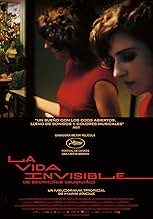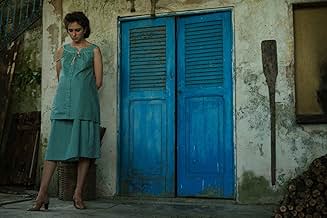La Vie invisible d'Eurídice Gusmão
Original title: A Vida Invisível de Eurídice Gusmão
IMDb RATING
7.7/10
10K
YOUR RATING
In 1950s Rio de Janeiro, two sisters live restricted lives with their conservative parents. After they are separated and forced to live apart, they try to take control of their destinies and... Read allIn 1950s Rio de Janeiro, two sisters live restricted lives with their conservative parents. After they are separated and forced to live apart, they try to take control of their destinies and hold on to the hope of finding one another.In 1950s Rio de Janeiro, two sisters live restricted lives with their conservative parents. After they are separated and forced to live apart, they try to take control of their destinies and hold on to the hope of finding one another.
- Awards
- 38 wins & 53 nominations total
Gregório Duvivier
- Antenor
- (as Gregorio Duvivier)
Featured reviews
Greetings again from the darkness. Masterful storytelling when combined with expert filmmaking is a treasure to be appreciated and enjoyed, even if the story is not so pleasant. Such is the case with this gem from writer-director Karim Ainouz, who adapted the screenplay with Murilo Hauser and Ines Bortagaray from the novel "The Invisible Life of Euridice Gusmao" by Martha Bathala. Based in Rio de Janiero, the film blends the vibrant colors of the area with the traditional and restrictive Latin American family expectations of the 1950's.
The story spans 5 or 6 decades, and when we first meet sisters Euridice and Guida, it's clear they share a tight emotional bond that goes deeper than blood. Though their personalities differ greatly, they are both ahead of their time and out of step with the conventions of the era. Euridice (a strong performance by Carol Duarte) longs for independence and aspires to be a concert pianist after a hoped-for Conservatory in Vienna, while Guida (a powerhouse Julia Stockler) is a dreamer seeking true love, and whose party girl ways must be kept hidden from their conservative father. Both young ladies are spirited, yet respectful.
Their lives are forever altered when Guida runs off to Greece with her sailor lover. As is too often the case with young dreamers, she returns home once her spontaneous choices prove to be poor judgment. Her father rejects his pregnant daughter since, in his eyes, she has disgraced the family. The parents mislead Guida about her sister's whereabouts, so Guida assumes Euridice is off at conservatory fulfilling her dreams. This sets Guida off on her own solitary path.
In actuality, Euridice has married and experienced one of the worst ever wedding nights, featuring what is likely cinema's most unsexy bathroom lovemaking scene. There is an element of horror films to this segment of the film, as the sisters are living their worst nightmares, while being separated from each other ... unable to communicate. The male-dominated Latin culture and family traditions prevent their mother from 'disobeying' the father's order, so the cruel lie continues as the sisters unknowingly live their lives within the same town. There is even one excruciatingly painful-to-watch scene that finds them in the same restaurant at the same time, yet oblivious to the presence of the other.
Each woman's inner-strength pushes them forward. Guida (now Gisele) befriends a wise former prostitute Filomena (an excellent Barbara Santos) who becomes her mentor in poverty. Euridice tries to make the best of her situation while keeping her dream alive. Mostly what we have is a tragic story without one specific tragedy - other than the daughter spurned by her father. There are so many moments of pain and frustration, with undelivered mail being among the worst. The film is beautifully shot by cinematographer Helene Louvart, and it reminds us that 'life happens', and it's not all love and Bach. This is an emotional and heart-breaking story, and devotees of The Lifetime Channel will likely be disappointed in the ending. For me, I have no qualms about the emotional wringer the film puts viewers through - even after the opening scene foreshadowing.
The story spans 5 or 6 decades, and when we first meet sisters Euridice and Guida, it's clear they share a tight emotional bond that goes deeper than blood. Though their personalities differ greatly, they are both ahead of their time and out of step with the conventions of the era. Euridice (a strong performance by Carol Duarte) longs for independence and aspires to be a concert pianist after a hoped-for Conservatory in Vienna, while Guida (a powerhouse Julia Stockler) is a dreamer seeking true love, and whose party girl ways must be kept hidden from their conservative father. Both young ladies are spirited, yet respectful.
Their lives are forever altered when Guida runs off to Greece with her sailor lover. As is too often the case with young dreamers, she returns home once her spontaneous choices prove to be poor judgment. Her father rejects his pregnant daughter since, in his eyes, she has disgraced the family. The parents mislead Guida about her sister's whereabouts, so Guida assumes Euridice is off at conservatory fulfilling her dreams. This sets Guida off on her own solitary path.
In actuality, Euridice has married and experienced one of the worst ever wedding nights, featuring what is likely cinema's most unsexy bathroom lovemaking scene. There is an element of horror films to this segment of the film, as the sisters are living their worst nightmares, while being separated from each other ... unable to communicate. The male-dominated Latin culture and family traditions prevent their mother from 'disobeying' the father's order, so the cruel lie continues as the sisters unknowingly live their lives within the same town. There is even one excruciatingly painful-to-watch scene that finds them in the same restaurant at the same time, yet oblivious to the presence of the other.
Each woman's inner-strength pushes them forward. Guida (now Gisele) befriends a wise former prostitute Filomena (an excellent Barbara Santos) who becomes her mentor in poverty. Euridice tries to make the best of her situation while keeping her dream alive. Mostly what we have is a tragic story without one specific tragedy - other than the daughter spurned by her father. There are so many moments of pain and frustration, with undelivered mail being among the worst. The film is beautifully shot by cinematographer Helene Louvart, and it reminds us that 'life happens', and it's not all love and Bach. This is an emotional and heart-breaking story, and devotees of The Lifetime Channel will likely be disappointed in the ending. For me, I have no qualms about the emotional wringer the film puts viewers through - even after the opening scene foreshadowing.
How much did our mothers and grandmothers suffer from the patriarchy? How much did they have to hide, supress and ignore to protect us from past abuses?
Karim Ainouz tells, in his emotional tropical melodrama, stories from a time when a woman was expected to be subordinate in every single aspect of her life. Guida and Eurídice, apart from each other, lived outrageous trajectories, and, unfortunately, with expressive scars that lasted until today. The lies of extremally conservative parents, the superb and envy of Eurídice's husband, the suffering in maternity, the crucial solidarity between desperate women - all of it built a strong indignation and, at last, everybody cries in the end: a real tragic one. Fernanda Montenegro is an acting gem.
With technical maestry, Karim's team guides the movie in a raw way. The cinematography of Hélène Louvart is outstanding capturing old, green and dirty Rio de Janeiro. Karim's directing choices are really touching and carry a whole bunch of social issues with flow. The cello and piano from Benedikt Schiefer are as unsettling as the character's obstacles.
I hope that when women (especially older ones) watch this movie, they identify themselves and keep fighting against the male authoritarianism, fighting for freedom. I hope that when men watch this movie, they identify in themselves traces of sexism to keep changing, to keep evolving and encouraging other ones to be better.
It's definitely an incredible and important movie that answers the questions above with some of the multiple possibilites, multiple realities that exist. It's a must see
Karim Ainouz tells, in his emotional tropical melodrama, stories from a time when a woman was expected to be subordinate in every single aspect of her life. Guida and Eurídice, apart from each other, lived outrageous trajectories, and, unfortunately, with expressive scars that lasted until today. The lies of extremally conservative parents, the superb and envy of Eurídice's husband, the suffering in maternity, the crucial solidarity between desperate women - all of it built a strong indignation and, at last, everybody cries in the end: a real tragic one. Fernanda Montenegro is an acting gem.
With technical maestry, Karim's team guides the movie in a raw way. The cinematography of Hélène Louvart is outstanding capturing old, green and dirty Rio de Janeiro. Karim's directing choices are really touching and carry a whole bunch of social issues with flow. The cello and piano from Benedikt Schiefer are as unsettling as the character's obstacles.
I hope that when women (especially older ones) watch this movie, they identify themselves and keep fighting against the male authoritarianism, fighting for freedom. I hope that when men watch this movie, they identify in themselves traces of sexism to keep changing, to keep evolving and encouraging other ones to be better.
It's definitely an incredible and important movie that answers the questions above with some of the multiple possibilites, multiple realities that exist. It's a must see
What a great movie it is! So beautiful in every sense. It's a very touching journey of two sisters who got separated and had to live separately without knowing each other's existence for a very very long time. Their emotional journey, the struggle and the pain they endure have been filmed so well. The representation of the patriarchy structure of society where the females struggle to live their dreams and how they put their everything for the family, has been shown very nicely. The journey through Brazil of 50's is very beautiful. A must watch!
An immersive experience with great acting and a terrific story. One of the best movies of 2019. Highly recommended!
The Invisible Life of Euridice Gusmao is a melodrama that gives the audience a look at Brazilian culture during the 1950s and what life was like for most women under the patriarchal society that often made them struggle to succeed. What captured my attention from the outset were the spectacular set design and the period costumes that accurately depict life from that time. The production team, particularly director Karim Aïnouz and producer Rodrigo Teixeira, have my ultimate respect in nailing those aspects so accurately. This film entertained and educated me about that period of time and its culture, which are very unique characteristics I don't often see, but love.
The film is about two inseparable sisters living in Rio de Janeiro during the 1950s, that live under their conservative parents' strict guidance. Even though both sisters are involved in the traditional life that surrounds them, Euridice wants to become a renowned pianist and Guida wants to find true love. When their father separates them and makes them live apart from each other, they work to meet their goals, while hoping that they can reunite one day and celebrate life together, since they are each other's support and joy.
My favorite scene is when Euridice carefully covers for Guida's secret nighttime outings to dance clubs with a Greek sailor. She encourages her sister to not give in to their parents' strict lifestyle and proposes that they should expose themselves to experiences that will fill them with happiness.
The important message that I learned from this film is the importance of how women have fought for their place and equality within a patriarchal society. Before, women were submissive to the patriarch, but as time has passed, society has realized what a huge injustice was being made and corrected the social forms. This movie is very big on showing how times were different back then for women and how thankful we all must be that a turn was made. Young women like Euridice and Guida struggled from an early age to find happiness. I rate this movie 5 out of 5 stars and recommend it for ages 13 to 18, plus adults.
Reviewed by Alejandra G. , KIDS FIRST! Reviewers. For more film reviews by tweens and teens, visit kidsfirst dot org.
The film is about two inseparable sisters living in Rio de Janeiro during the 1950s, that live under their conservative parents' strict guidance. Even though both sisters are involved in the traditional life that surrounds them, Euridice wants to become a renowned pianist and Guida wants to find true love. When their father separates them and makes them live apart from each other, they work to meet their goals, while hoping that they can reunite one day and celebrate life together, since they are each other's support and joy.
My favorite scene is when Euridice carefully covers for Guida's secret nighttime outings to dance clubs with a Greek sailor. She encourages her sister to not give in to their parents' strict lifestyle and proposes that they should expose themselves to experiences that will fill them with happiness.
The important message that I learned from this film is the importance of how women have fought for their place and equality within a patriarchal society. Before, women were submissive to the patriarch, but as time has passed, society has realized what a huge injustice was being made and corrected the social forms. This movie is very big on showing how times were different back then for women and how thankful we all must be that a turn was made. Young women like Euridice and Guida struggled from an early age to find happiness. I rate this movie 5 out of 5 stars and recommend it for ages 13 to 18, plus adults.
Reviewed by Alejandra G. , KIDS FIRST! Reviewers. For more film reviews by tweens and teens, visit kidsfirst dot org.
Did you know
- TriviaBrazil's official submission for the 'Best Foreign Language Film' category at the 92nd Academy Awards in 2020. Runner-up was Bacurau (2019).
- ConnectionsFeatured in Conversa com Bial: Episode dated 4 July 2019 (2019)
Details
- Release date
- Countries of origin
- Official site
- Languages
- Also known as
- La Vie invisible d'Euridice Gusmao
- Filming locations
- Pedregulho Housing Complex - Rua Marechal Jardim, São Cristóvão, Rio de Janeiro, Brazil(elder Euridice's apartment)
- Production companies
- See more company credits at IMDbPro
Box office
- Gross US & Canada
- $146,535
- Opening weekend US & Canada
- $8,127
- Dec 22, 2019
- Gross worldwide
- $1,776,017
- Runtime
- 2h 19m(139 min)
- Color
- Aspect ratio
- 2.39 : 1
Contribute to this page
Suggest an edit or add missing content































